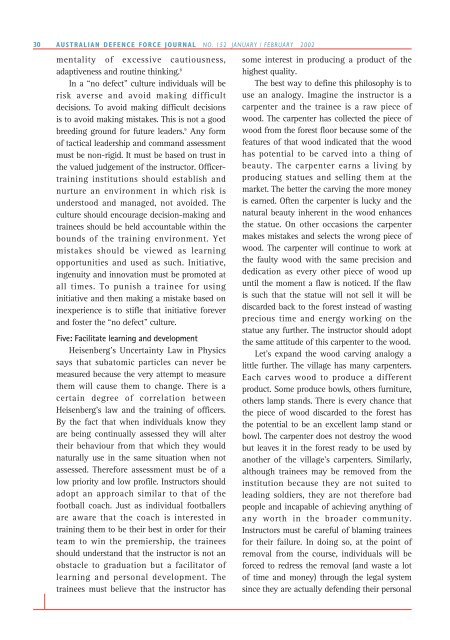ISSUE 152 : Jan/Feb - 2002 - Australian Defence Force Journal
ISSUE 152 : Jan/Feb - 2002 - Australian Defence Force Journal
ISSUE 152 : Jan/Feb - 2002 - Australian Defence Force Journal
- No tags were found...
You also want an ePaper? Increase the reach of your titles
YUMPU automatically turns print PDFs into web optimized ePapers that Google loves.
30AUSTRALIAN DEFENCE FORCE JOURNAL NO. <strong>152</strong> JANUARY / FEBRUARY <strong>2002</strong>mentality of excessive cautiousness,adaptiveness and routine thinking. 8In a “no defect” culture individuals will berisk averse and avoid making difficultdecisions. To avoid making difficult decisionsis to avoid making mistakes. This is not a goodbreeding ground for future leaders. 9 Any formof tactical leadership and command assessmentmust be non-rigid. It must be based on trust inthe valued judgement of the instructor. Officertraininginstitutions should establish andnurture an environment in which risk isunderstood and managed, not avoided. Theculture should encourage decision-making andtrainees should be held accountable within thebounds of the training environment. Yetmistakes should be viewed as learningopportunities and used as such. Initiative,ingenuity and innovation must be promoted atall times. To punish a trainee for usinginitiative and then making a mistake based oninexperience is to stifle that initiative foreverand foster the “no defect” culture.Five: Facilitate learning and developmentHeisenberg’s Uncertainty Law in Physicssays that subatomic particles can never bemeasured because the very attempt to measurethem will cause them to change. There is acertain degree of correlation betweenHeisenberg's law and the training of officers.By the fact that when individuals know theyare being continually assessed they will altertheir behaviour from that which they wouldnaturally use in the same situation when notassessed. Therefore assessment must be of alow priority and low profile. Instructors shouldadopt an approach similar to that of thefootball coach. Just as individual footballersare aware that the coach is interested intraining them to be their best in order for theirteam to win the premiership, the traineesshould understand that the instructor is not anobstacle to graduation but a facilitator oflearning and personal development. Thetrainees must believe that the instructor hassome interest in producing a product of thehighest quality.The best way to define this philosophy is touse an analogy. Imagine the instructor is acarpenter and the trainee is a raw piece ofwood. The carpenter has collected the piece ofwood from the forest floor because some of thefeatures of that wood indicated that the woodhas potential to be carved into a thing ofbeauty. The carpenter earns a living byproducing statues and selling them at themarket. The better the carving the more moneyis earned. Often the carpenter is lucky and thenatural beauty inherent in the wood enhancesthe statue. On other occasions the carpentermakes mistakes and selects the wrong piece ofwood. The carpenter will continue to work atthe faulty wood with the same precision anddedication as every other piece of wood upuntil the moment a flaw is noticed. If the flawis such that the statue will not sell it will bediscarded back to the forest instead of wastingprecious time and energy working on thestatue any further. The instructor should adoptthe same attitude of this carpenter to the wood.Let's expand the wood carving analogy alittle further. The village has many carpenters.Each carves wood to produce a differentproduct. Some produce bowls, others furniture,others lamp stands. There is every chance thatthe piece of wood discarded to the forest hasthe potential to be an excellent lamp stand orbowl. The carpenter does not destroy the woodbut leaves it in the forest ready to be used byanother of the village's carpenters. Similarly,although trainees may be removed from theinstitution because they are not suited toleading soldiers, they are not therefore badpeople and incapable of achieving anything ofany worth in the broader community.Instructors must be careful of blaming traineesfor their failure. In doing so, at the point ofremoval from the course, individuals will beforced to redress the removal (and waste a lotof time and money) through the legal systemsince they are actually defending their personal
















